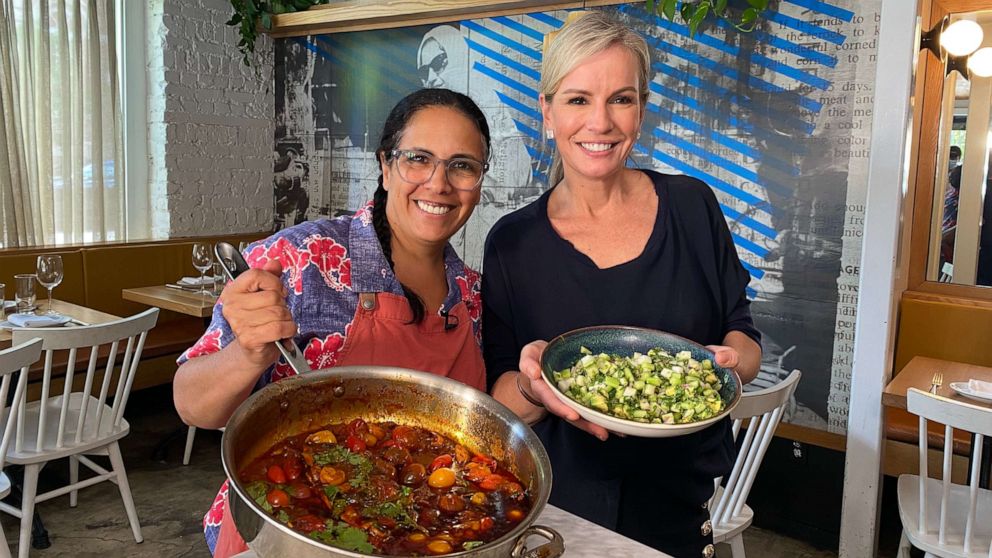


Crisp cucumbers at peak seasonality. Freshly picked dill and tender herbs torn or roughly chopped that act as nature's aromatherapy in any kitchen. Descaling locally caught seafood to portion out perfect individual filets. Fragrant spices with vibrant brick red to golden yellow hues that promise depth and nuance for future dishes. Expertly pressed extra virgin olive oil to add a delicate layer of healthy fat onto anything from proteins to greens. Each of these components harmoniously contributes to the profile of Mediterranean cuisine.
For years, New York City-based chef, restaurateur and cookbook author Einat Admony has masterfully wielded those ingredients, intrinsic to her own Israeli heritage, which have become popularized as part of the Mediterranean diet.

The James Beard Award semifinalist showed "Good Morning America" how to transform staples like kohlrabi, cucumber, avocado and herbs into an elevated, balanced raw salad, and how to create Moroccan-inspired fish braised with homemade harissa and burst cherry tomatoes that highlight the elegant simplicity of Mediterranean cuisine.
Fare from afar: Chef shares authentic ingredients, dishes of Greek cuisine to transport your taste buds
Ingredients
4 Persian or 2 large regular cucumbers, cut into 1/2-inch (1.5 cm) chunks
1 medium kohlrabi or small jicama, peeled and cut into 1/2-inch (1.5 cm) chunks
1 medium red onion, finely chopped
1 jalapeño chili, cored, seeded and minced
1/2 cup chopped fresh cilantro
1/4 cup chopped fresh mint
1/4 cup fresh lemon juice
1 teaspoon kosher salt, plus more as needed
Freshly ground black pepper
2 ripe but firm medium avocados, cut into 1/2-inch (1.5 cm) chunks
Lemon wedges, for serving
Directions
Combine the cucumbers, kohlrabi, onion, jalapeño, cilantro, and mint in a large bowl. Add the lemon juice, salt, and a few twists of pepper. Toss, then add the avocados, and toss gently once more, taking care not to mash the avocados. Taste and adjust the seasoning. Serve at once with lemon wedges, for squeezing.
"Fish chunks, fillets or steaks cut on the bone are cooked in a bright-red fiery sauce and served with couscous or lots of soft white bread to mop up the sauce," the chef wrote alongside the recipe in her debut cookbook "Balaboosta: Bold Mediterranean Recipes to Feed the People You Love."
"As with most ethnic recipes there is no single recipe and every North African house hold has its take on this classic. In the Tunisian version, known as Chreime, the cooking sauce is based on oil infused with aromatics (cumin, caraway and lots of cayenne). Moroccan 'spicy fish' is more nuanced and contains fresh tomatoes and peppers (fresh and dried) as well as a whole bunch of cilantro. Ours falls somewhere in between but is closer in spirit to the Moroccan one. Cherry tomatoes are not traditional but add elegance and a fresh sweet touch to this gutsy dish."
Serves: 6
Ingredients
1/3 cup vegetable oil
10 garlic cloves, smashed
1 jalapeño peper, seeded and thinly sliced
1 tablespoon harissa (store bought or recipe below)
3 tablespoons best quality sweet paprika
1 teaspoon ground caraway
1 1/2 teaspoon cumin
2 pints cherry tomatoes
1/2 cup water
1 large bunch cilantro
6 portion size fish filets (grouper, bass, snapper, halibut), 7-9 ounces each each, skin-on
Kosher salt and freshly ground black pepper
Directions
Pour the oil to a relatively deep, large saute pan. Immediately add the smashed garlic cloves, and cook on low heat only until the cloves are soft and fragrant, bout 3-4 minutes. Be careful not to brown the garlic, lest it turn bitter.
Stir in jalapeno, harissa, tomato paste, paprika, caraway, and cumin and cook stirring often until fragrant, for 1-2 minutes. Add 1 1/2 pint cherry tomatoes (reserve the rest for later) and a pinch of salt and cook stirring occasionally until the tomatoes start to break down, about 7-8 minutes.
Pour in the water, bring to a simmer, cover and cook over low heat about for 30 minutes. Taste and season with salt and pepper to taste. Once you add the fish, you won't be able to stir the sauce and play with seasonings -- taste it and make sure it is spicy and packed with flavor.
Remove about 3 tablespoons of whole cilantro leaves and reserve for garnish. Tear the rest of the bunch into large chunks and add to the pan.
Add the fish filets to the pan, skin side up, tucking them gently into the sauce. Sprinkle the remaining 1/2 pint of cherry tomatoes on top of the fish.
Bring to a simmer on medium heat, reduce the heat to low, cover and cook without stirring for 7-8 minutes, only until the fish is cooked through. Thicker fillets, like halibut, might take a bit longer. To check the fish for doneness, make a small incision in the thickest part of the fish and make sure the flesh is opaque and flaky.
Garnish with whole cilantro leaves and serve straight out of the pan with a lot of bread or over couscous. You can also make the dish in advance, store it in the fridge for a day or two and reheat it before serving.
Grandmother's trick
"Fresh seawater fish is expensive in Israel, so many home cooks make do with inexpensive frozen fish fillets, especially during midweek meals. If the fish is cooked in a rich sauce, such as this, you can get away with it. The problem is that defrosted fish tastes, well ... fishy," Admony explained. "This simple technique drives away unpleasant aftertastes and somewhat improves the texture. Thaw the fish in a bowl of ice-cold water. Once thawed, put in a shallow bowl sprinkle with salt and give it a general squeeze of fresh lemon juice. Let the fish sit in the lemon juice for 5-7 minutes, rinse with water, pat dry and continue with the recipe."
Makes: About 2 1/2 Cups
Ingredients
10 garlic cloves
1 large roasted red bell pepper, peeled, cored, and seeded
1 1/4 cups canola oil
1/4 cup tomato paste
1/2 cup ground cumin
1/3 cup cayenne
1/3 cup sweet Hungarian paprika
1/4 cup ground caraway
2 tablespoons kosher salt
Directions
Combine the garlic, bell pepper, 1 cup of the oil, and the tomato paste in a food processor. Pulse until the mixture is almost pureed.
Add the cumin, cayenne, paprika, caraway, and salt. Slowly drizzle in the remaining 1/4 cup oil while the machine is running. Keep processing until the harissa is completely pureed and all the ingredients are thoroughly combined.
Store the harissa in an airtight container in the refrigerator for up to 3 months.